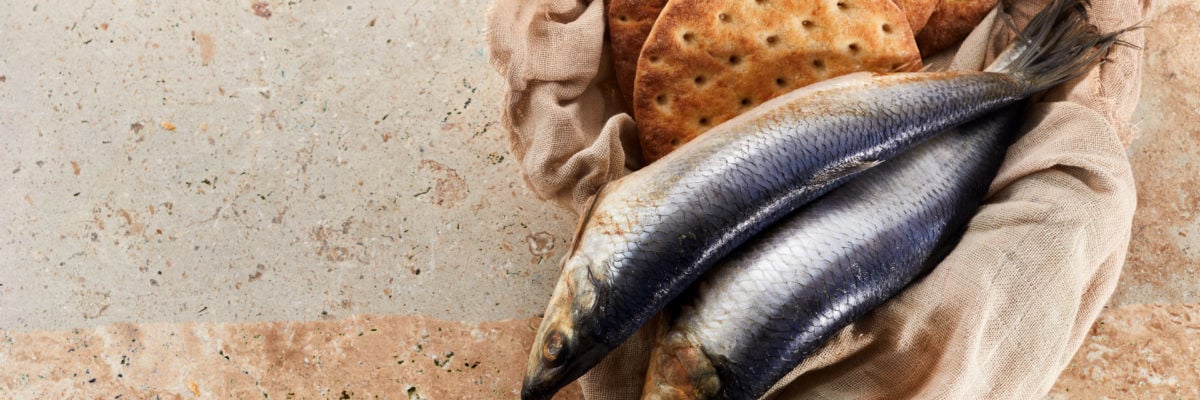
The loaves and fishes. The feeding of the five thousand. It has to be one of the most memorable stories in the Gospels—not just to us, but to the Gospel writers themselves. It’s one of the few things to appear in all four. It is therefore not just memorable, but important.
For John, the feeding of the five thousand leads straight into what we sometimes call the “bread of life” discourse, which is some of the most striking eucharistic language in the New Testament. Not long after he multiplies the loaves and fish, he begins talking about his own flesh and blood as food and drink. The implications are fairly obvious to any Catholic Christian: the feeding of the five thousand is a sign of Christ’s sacramental economy and the multiplication of grace.
These eucharistic themes aren’t quite as clear in the other Gospels. Although the Fathers are never shy about finding connections to the Eucharist, in this case, they’re drawn more to the symbolism of Jesus’ teaching. In his teaching, Jesus is often shown as the New Moses, handing forth the law of God. And so in reading this passage, the Fathers often think about the continuity between old and new. Our lectionary texts today suggest this. Elisha feeds a large number of people with a small number of loaves. As good Jewish boys, the disciples would have been familiar with this story. So the multiplication of the loaves and the fish is a sign of not just Jesus’ own miraculous ministry, but also exactly how that ministry is related to the law and the prophets before him.
For some of the Fathers, the five loaves are the law, and the two fishes are the priesthood and the monarchy. For others, they are the prophets and the writings, or the psalms. The five loaves might also represent the five senses, because the law was a law of the flesh—its sign, after all, was circumcision. In any case, Jesus breaks them open, which is to say he expands them, shares them, draws out their inner riches. This is a theme throughout the Gospels—Jesus opening people’s hearts and minds to the scriptures. He’s not changing them, but he’s revealing them in a new way, in light of himself and his presence.
What about the leftovers? I love St. Augustine’s take on this: He says that they are “an intimation, that those deeper truths, which the multitude cannot take in, should be entrusted to those who are capable of receiving them, and afterwards teaching them to others; as were the apostles. For which reason twelve baskets were filled with them.” That’s a beautiful description of the deposit of faith and the apostolic tradition.
But here’s the point: for Jesus, five loaves and two fishes are a feast. Whether we’re talking about the abundance of the meal itself, the abundance of the sacraments of grace, or the abundance of divine teaching, the lesson is the same: what seems to us to be very little is actually more than we can handle. No doubt this is a lesson to remember every time we approach the Eucharist. How can something so little, so insignificant, contain all the power of creation? How can the finite contain the infinite?
This lesson in the Eucharist, and in the miraculous loaves and fish, extends farther. For this is how God works. It is how Christ shows his life in us. We have to learn, as the disciples had to learn, to see abundance rather than scarcity, plenty rather than lack, promise and hope rather than despair.
In our consumer culture, this is a hard lesson. There is never enough time, never enough money, never enough energy. We can quickly get bogged down in all the “more” that we know we want: more people, more money, more stuff.
But what is it that our Lord teaches us in the Our Father? Give us this day our daily bread. Supersubstantial bread, in the Greek and the Latin, another likely eucharistic reference. And also a clear reference to our story of the loaves the fish. In the hands of Jesus, not enough becomes more than enough.
That is the way that I think our Lord wishes us to live in general: in generosity, in hope, in trust. But I do want to linger on the point about community life. Take a new parish as an example. It’s hard to imagine exactly what the future holds in terms of the congregation, the facilities, the finances.
The main thing I know, in a new parish or in an old one, is that I am not in nearly as much control of the future as I would wish. But I also know that God has given us everything we need to worship him and follow him. And it’s not crazy, in light of the gospel, to gather up our loaves and fishes, to distribute them in an act of faith, and see what happens.
Who, in the end, are you in the story? I wonder if in many cases we are the boy with the little lunch who realizes that his gifts might be so much more if they were shared. What are your loaves? What are your fishes? No one knows but you. And the world is hungry.



